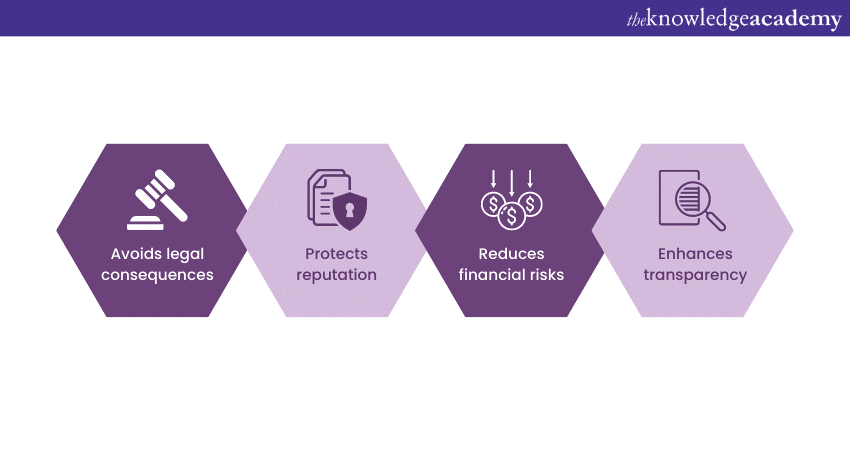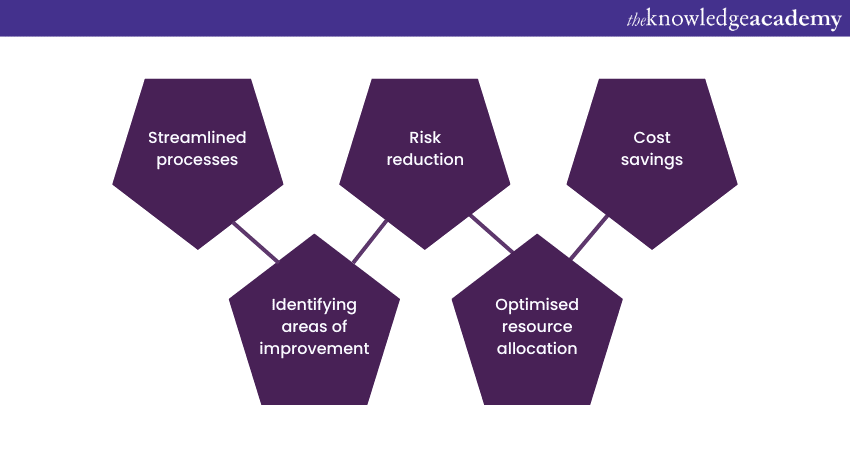We may not have the course you’re looking for. If you enquire or give us a call on +44 1344 203 999 and speak to our training experts, we may still be able to help with your training requirements.
We ensure quality, budget-alignment, and timely delivery by our expert instructors.

Compliance offers numerous advantages for organisations. From mitigating risks to enhancing reputation, it is crucial to ensuring ethical business practices. Understanding the Benefits of Compliance is essential for businesses to thrive in a highly regulated environment.
According to Talent.com, the average annual salary of a Compliance Manager in the UK is £45,378. In this blog, you will learn about the five essential Benefits of Compliance. Let's delve in deeper to learn more about these benefits.
Table of Contents
1) Top Five Benefits of Compliance
a) Boosting company reputation and trust
b) Mitigating legal and financial risks
c) Increasing operational efficiency
d) Enhancing employee satisfaction and retention
e) Driving business growth and competitive advantage
2) Conclusion
Top Five Benefits of Compliance
Compliance training provides several key benefits for organisations. Let's explore five significant benefits of good compliance.
Boosting company reputation and trust
Compliance plays a crucial role in enhancing a company's reputation and establishing trust among stakeholders. Here are key points highlighting how compliance boosts company reputation:
1) Credibility and trust: Demonstrating commitment to compliance enhances a company's credibility and instils trust in customers, stakeholders, and the general public.
2) Positive brand image: Prioritising compliance helps build a positive brand image, reflecting ethical practices and responsible conduct.
3) Customer confidence and loyalty: Compliance reinforces customer trust, increasing company confidence and fostering long-term customer loyalty.
4) Increased business opportunities: A strong reputation attracts potential investors, partners, and customers, opening doors to new markets and business opportunities.
5) Employee attraction and retention: Organisations with a solid compliance framework are more likely to attract top talent and retain employees who value a safe and ethical work environment.
By prioritising compliance, companies can build a strong reputation that differentiates them from competitors, establishes customer loyalty, and creates a foundation for sustainable growth.

Mitigating legal and financial risks
Compliance is vital in mitigating potential legal and financial risks for organisations. Here are key points that highlight how compliance helps in risk mitigation:

1) Preventing legal consequences: By adhering to laws, regulations, and industry standards, organisations minimise the risk of legal violations and the associated consequences, such as fines, penalties, and lawsuits.
2) Protecting reputation: Non-compliance can lead to reputational damage, which can have long-lasting effects on a company's brand image and customer trust. Compliance helps protect the company's reputation by ensuring ethical conduct and responsible practices.
3) Financial stability: Compliance practices help identify and address financial risks, ensuring accurate financial reporting and reducing the likelihood of financial irregularities or fraud.
4) Staying updated: Compliance requires organisations to stay updated with regulatory changes and industry best practices. This proactive approach helps businesses anticipate and adapt to evolving requirements, reducing the risk of non-compliance.
5) Internal control framework: Compliance frameworks often involve establishing internal controls and governance structures that monitor and mitigate risks across various business functions. These controls enhance transparency, accountability, and risk management within the organisation.
Organisations can minimise legal and financial risks, protect their reputation, and ensure financial stability by investing in compliance training and maintaining robust compliance practices. Proactive risk mitigation through compliance fosters a culture of compliance and integrity within the organisation, safeguarding against potential liabilities and contributing to long-term success.
Increasing operational efficiency
Compliance standards ensure legal adherence and offer significant benefits in terms of operational efficiency. Here are key points highlighting how compliance contributes to increased operational efficiency:

1) Streamlined processes: Compliance requirements often involve implementing standardised procedures and best practices. These guidelines help organisations streamline their operations, eliminate redundancies, and optimise workflows.
2) Identifying areas of improvement: Compliance protocols allow organisations to assess their current practices and identify areas of improvement. Companies can discover inefficiencies and implement targeted enhancements by evaluating existing processes through a compliance lens.
3) Risk reduction: Compliance practices inherently address potential risks and vulnerabilities within the organisation. By proactively mitigating risks, organisations can minimise disruptions, errors, and financial losses, thereby improving overall operational efficiency.
4) Optimised resource allocation: Compliance standards often require resource allocation in areas such as data management, security, and employee training. This focused allocation of resources ensures that they are used effectively and efficiently to support compliance requirements.
5) Cost savings: Implementing efficient compliance processes and controls can lead to cost savings in the long run. Organisations can optimise their financial resources by eliminating unnecessary expenses, reducing errors, and avoiding fines or penalties.
Organisations can enhance their operational efficiency by integrating compliance considerations into daily operations. Compliance-driven processes, risk reduction, optimised resource allocation, and cost savings collectively contribute to a more streamlined and effective business environment. Ultimately, increased operational efficiency positively impacts productivity and improves customer satisfaction.
Strengthen your organisation's security posture and achieve regulatory compliance excellence with our comprehensive Security Governance And Compliance Training – Sign up now!
Enhancing employee satisfaction and retention
Compliance training and a culture of compliance contribute significantly to employee satisfaction and retention. Here are key points highlighting how compliance enhances the well-being of employees:
1) Clear expectations: Compliance training provides employees with a clear understanding of the organisation's expectations regarding ethical conduct, regulatory compliance, and responsible practices. This clarity reduces ambiguity and empowers employees to make informed decisions.
2) Support and guidance: Investing in compliance training demonstrates that the organisation values its employees' well-being and supports them in navigating complex regulatory landscapes. Employees may feel supported and equipped with the knowledge and skills necessary to fulfil compliance requirements.
3) Ethical decision-making: Compliance training equips employees with the necessary tools to make ethical decisions in their day-to-day work. This empowers employees to act with integrity and make choices aligned with the organisation's values, leading to a sense of pride and job satisfaction.
4) Confidence and professional growth: Training employees on compliance builds their confidence in understanding legal and regulatory frameworks. This knowledge enhances their job performance and contributes to their professional growth and development.
5) Safe and ethical work environment: Organisations that prioritise compliance create a safe and ethical work environment. Employees feel secure knowing that the organisation values responsible practices, protecting their well-being and fostering a positive workplace culture.
6) Employee retention: A strong compliance culture contributes to higher employee retention rates. Employees are highly likely to stay with an organisation that prioritises their well-being, supports their growth, and provides an ethical and safe work environment.
By enhancing employee satisfaction and retention, compliance training and practices contribute to a positive work culture, improved morale, and higher employee engagement. Engaged employees are highly likely to be productive and loyal and contribute positively to the organisation's overall success.
Driving business growth and competitive advantage
Compliance can be a strategic driver for business growth and a source of competitive advantage. Here are some key points highlighting how compliance contributes to driving business growth:
1) Enhanced reputation: Demonstrating a commitment to compliance helps build a positive reputation for the organisation. A strong reputation attracts customers, partners, and investors who value ethical conduct and responsible business practices.
2) Customer trust and loyalty: Compliance instils confidence in customers, assuring them that the organisation operates with integrity and prioritises their interests. This trust leads to increased customer loyalty and repeat business.
3) Market differentiation: Compliance can differentiate a business from its competitors. By highlighting compliance as a core value, you can attract clients who prioritise working with trustworthy and compliant partners and stand out in the market.
4) Access to opportunities: Compliance opens doors to new business opportunities. Many clients, partners, and government entities require proof of compliance before engaging in business relationships. Organisations can access a wider range of opportunities by meeting these compliance requirements.
5) Improved Risk Management: Compliance frameworks inherently focus on risk management. By identifying and mitigating risks, organisations can navigate challenges more effectively and seize growth opportunities with reduced uncertainties.
6) Expansion into regulated markets: Compliance with industry-specific regulations allows organisations to expand into regulated markets. This provides access to new customer bases and revenue streams that may not be available to non-compliant competitors.
By leveraging compliance as a strategic advantage, organisations can position themselves for sustainable growth and gain a competitive edge in the marketplace. Compliance-driven business practices attract customers, enhance reputation, and open doors to new opportunities, contributing to long-term success and profitability.
Equip your workforce with the knowledge and skills they need to drive a culture of compliance with our Effective Compliance Training – Sign up today!
Conclusion
We hope that you understand the various Benefits of Compliance with this blog. Prioritising compliance offers numerous benefits for organisations, like increased opportunities for business growth and competitive advantage. Embracing compliance is essential for an organisation’s long terms success.
Elevate your organisation's performance through our comprehensive Compliance Training Courses – Sign up now!
Frequently Asked Questions
Upcoming ISO & Compliance Resources Batches & Dates
Date
 PCI DSS Implementer
PCI DSS Implementer
Thu 23rd Jan 2025
Thu 6th Feb 2025
Thu 3rd Apr 2025
Thu 5th Jun 2025
Thu 7th Aug 2025
Thu 2nd Oct 2025
Thu 4th Dec 2025







 Top Rated Course
Top Rated Course


 If you wish to make any changes to your course, please
If you wish to make any changes to your course, please


